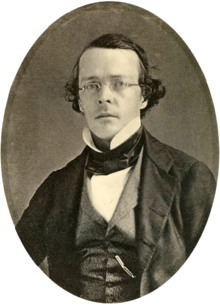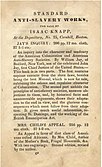Isaac Knapp
Isaac Knapp | |
|---|---|
 | |
| Born | January 11, 1804 Newburyport, Massachusetts |
| Died | September 14, 1843 (aged 39) |
| Occupation(s) | printer and publisher |
| Signature | |
Isaac Knapp (January 11, 1804 – September 14, 1843)[2] was an American abolitionist printer, publisher, and bookseller in Boston, Massachusetts. He is remembered primarily for his collaboration with William Lloyd Garrison in printing and publishing The Liberator newspaper.
Biography[edit]
Knapp was born in Newburyport, Massachusetts, to Philip Coombs Knapp and Abigail Remmick; siblings included Abigail Knapp.[3] In 1825 he was proprietor of the Essex Courant newspaper, published there.[4][5][page needed]
With his friend William Lloyd Garrison he printed the anti-slavery Liberator newspaper, from 1831 to 1839.[6][7] He also co-founded the New England Anti-Slavery Society.[8][9] His printing office was located on Congress Street (circa 1831) and then on Cornhill.[10][11] In 1837, the address of the Boston office of the American Anti-Slavery Society was Knapp's address. (See sidebar.) In later years of the 1830s he ceased printing books, used other printers, and turned his printing office into a bookstore. He frequently used blank pages at the end of the books he published to advertise a large and ever-changing list of abolitionist publications available from him.

Knapp's name disappears from the masthead as printer of The Liberator as of January 1840. In the July 24, 1840, issue, there is an advertisement for the abolitionist printers Dow and Jackson "successors to Isaac Knapp".[12]
We do not have Knapp's story of how and why this happened. Garrison described him as "a most loving, faithful, devoted friend and brother.... He was naturally amiable, kind, and obliging even to excess.... He deserves pity rather than censure, and never can I find it in my breast to say a bitter word of him.... I am not sure that I could have commenced the printing of the Liberator, had it not been for his uniting with me in partnership, and participating in the labors and necessities of my lone situation." However, according to Garrison, "he was altogether too generous...and having no business adaptation, be consequently involved himself deeply in debt while attempting to carry on business. It was thus he became depressed in spirit, and, instead of calmly submitting to the stroke of adversity, vainly sought to find relief from his sorrows (as millions have done before) in the intoxicating bowl." "[H]is disconnexion with the Liberator ...[was] absolutely essential to the existence of the paper."[13]
In 1841 Knapp complained that "he has been deprived of his interest in the Liberator unjustly—that Mr. Garrison and 'a certain rich man' have treated him badly—therefore he intends to print a paper to be called 'Knapp's Liberator'."[14] Only one issue of this paper is known to have been published, on January 8, 1842 (only known copy at the Massachusetts Historical Society).
Works issued by Knapp[edit]

Knapp as bookseller[edit]
- A catalog of anti-slavery publications sold by Isaac Knapp, published at end of Narrative of Joanna; An Emancipated Slave, of Surinam, 1838.
-
Catalog of anti-slavery publications sold by Isaac Knapp, p. 1
-
Catalog of anti-slavery publications sold by Isaac Knapp, p. 2
-
Catalog of anti-slavery publications sold by Isaac Knapp, p. 3
-
Catalog of anti-slavery publications sold by Isaac Knapp, p. 4
-
Catalog of anti-slavery publications sold by Isaac Knapp, p. 5
-
Catalog of anti-slavery publications sold by Isaac Knapp, p. 6
-
Catalog of anti-slavery publications sold by Isaac Knapp, p. 7
-
Catalog of anti-slavery publications sold by Isaac Knapp, p. 8
- "Descriptive Catalogue of Anti-Slavery Works, for Sale by Isaac Knapp" (PDF), Liberator, November 10, 1837
- Titles listed: Abolition of the Slave Trade, Adams' Letters, Adams' Oration, Adin Ballou's Discourse, Anti-Slavery Catechism, Anti-Slavery Manual, Anti-Slavery Record, Archy Moore, Authentic Anecdotes of American Slavery, Barrows on the Slave Question, Birney's Second Letter, Bourne's Picture, British Apprenticeships, Channing on Slavery, Channing on Texas, Charles Ball, Chloe Spear, Crandall's Trial, Discussion, Dissertation on Servitude, Dresser, Stones' Letters, &c., Enemies of the Constitution Discovered, Evils and Cure, Godwin on Slavery, Granville Sharp, Gustavus Vassa, Important Pamphlet, James Jackson, Jay's Inquiry, Juvenile Poems, Kentucky Address, Lemuel Haynes, Liberty, Memoir of Phillis Wheatley, Miss Beecher Reviewed, Miss Grimke's Appeal, Miss Grimke's Epistle, Mott's Sketches, Mrs. Child's Appeal, Mrs. Stewart's Productions, Objections Answered, Our Liberties in Danger, Phillis Wheatley, Rankin's Letters, Right and Wrong in Boston, Slave Produce, Slave's Friend, Smith's Bible Argument, Songs of the Free, Stanton's Remarks, Stewart's West India Question, Testimony of God Against Slavery, The Fountain, The Generous Planter, The Negro Pew, The Oasis, Thompson at Manchester, Thompson in America, Thompson in G. Britain, Thompson's Lectures and Debates, Valuable Documents, Vigilance Committee, Whittier's Poems, Wilberforce.
- "Standard Anti-Slavery Books for Sale by Isaac Knapp, no.25 Cornhill". Catalog is at end of book. 1838.
{{cite news}}: CS1 maint: others (link) - Another listing of anti-slavery books, pamphlets, and newspapers appeared in The Rochester Freeman in 1839.[15]
References[edit]
- ^ "DIED - In this city". The Liberator. Boston, Massachusetts. 22 Sep 1843. p. 3. Retrieved 24 August 2014 – via Newspapers.com.

- ^ ""Pedigree Resource File," database, FamilySearch, entry for Isaac /Knapp/". FamilySearch. The Church of Jesus Christ of Latter-day Saints. Retrieved 24 August 2014.
- ^ Walter McIntosh Merrill (1956). "Passionate Attachment: William Lloyd Garrison's Courtship of Helen Eliza Benson". New England Quarterly. 29 (2): 182–203. doi:10.2307/362183. JSTOR 362183.
- ^ Arthur Mason Knapp (1909), The Knapp Family in America, Boston: Fort Hill Press, p. 29, OCLC 9109492
- ^ The National cyclopaedia of American biography, being the history of the United States as illustrated in the lives of the founders, builders, and defenders of the republic, and of the men and women who are doing the work and moulding the thought of the present time, edited by distinguished biographers, selected from each state, revised and approved by the most eminent historians, scholars, and statesmen of the day. Vol. 2. New York: James T. White. 1910.
- ^ "Mr Isaac Knapp says that he has been deprived of his interest in the Liberator unjustly". Boston Post. 17 Dec 1841. p. 2. Retrieved 24 August 2014 – via Newspapers.com.

- ^ Berry, Faith (2006). From Bondage to Liberation: Writings by and about Afro-Americans. A&C Black. p. 92. ISBN 9780826418142. Retrieved 24 August 2014.
[Knapp's] gambling debts caused Garrison's supporters to buy out Knapp's financial interest [in The Liberator]. He later claimed fraud and published one issue of Knapp's Liberator, attacking Garrison, on January 8, 1842.
- ^ William Lloyd Garrison (1971). The Letters of William Lloyd Garrison: I will be heard, 1822-1835. Harvard University Press. ISBN 978-0-674-52660-0.
- ^ "Isaac Knapp". National Cyclopedia of American Biography. Vol. 2. J. T. White company. 1892. hdl:2027/nyp.33433082545652.
- ^ Boston Directory, 1831,
Garrison & Knapp, editors and proprietors Liberator, 10 Merchants Hall, Congress Street
- ^ Boston Directory, Boston, Sampson & Murdock company, 1835,
Garrison & Knapp, 31 Cornhill
- ^ "Abolitionist Press!". The Liberator. Boston, Massachusetts. July 24, 1840. p. 4.
- ^ Garrison, Wm. Lloyd (September 29, 1843). "Letter to the Editor". The Liberator. Boston, Massachusetts. p. 2 – via newspapers.com.
- ^ "All Sorts of Paragraphs". Boston Morning Post. December 17, 1841. p. 2 – via newspaperarchive.com.
- ^ "Anti-slavery books and pamphlets. Anti-slavery publications". The Rochester Freeman (Rochester, New York). 13 Nov 1839. p. 4 – via Newspapers.com.
Further reading[edit]
- Wendell Phillips Garrison; Francis Jackson Garrison (1885). William Lloyd Garrison, 1805-1879: The Story of His Life Told by His Children. Century Company. (mentions Knapp)
External links[edit]
- "Isaac Knapp". Portraits of American Abolitionists. Massachusetts Historical Society.
- "Knapp, Isaac, 1804-1843 -- Correspondence". Boston Public Library. (digitized letters)
- American publishers (people)
- 19th-century American newspaper publishers (people)
- American abolitionists
- American newspaper founders
- People from Newburyport, Massachusetts
- 19th century in Boston
- 1804 births
- 1843 deaths
- 19th-century American journalists
- American male journalists
- 19th-century American male writers
- American booksellers
- William Lloyd Garrison








